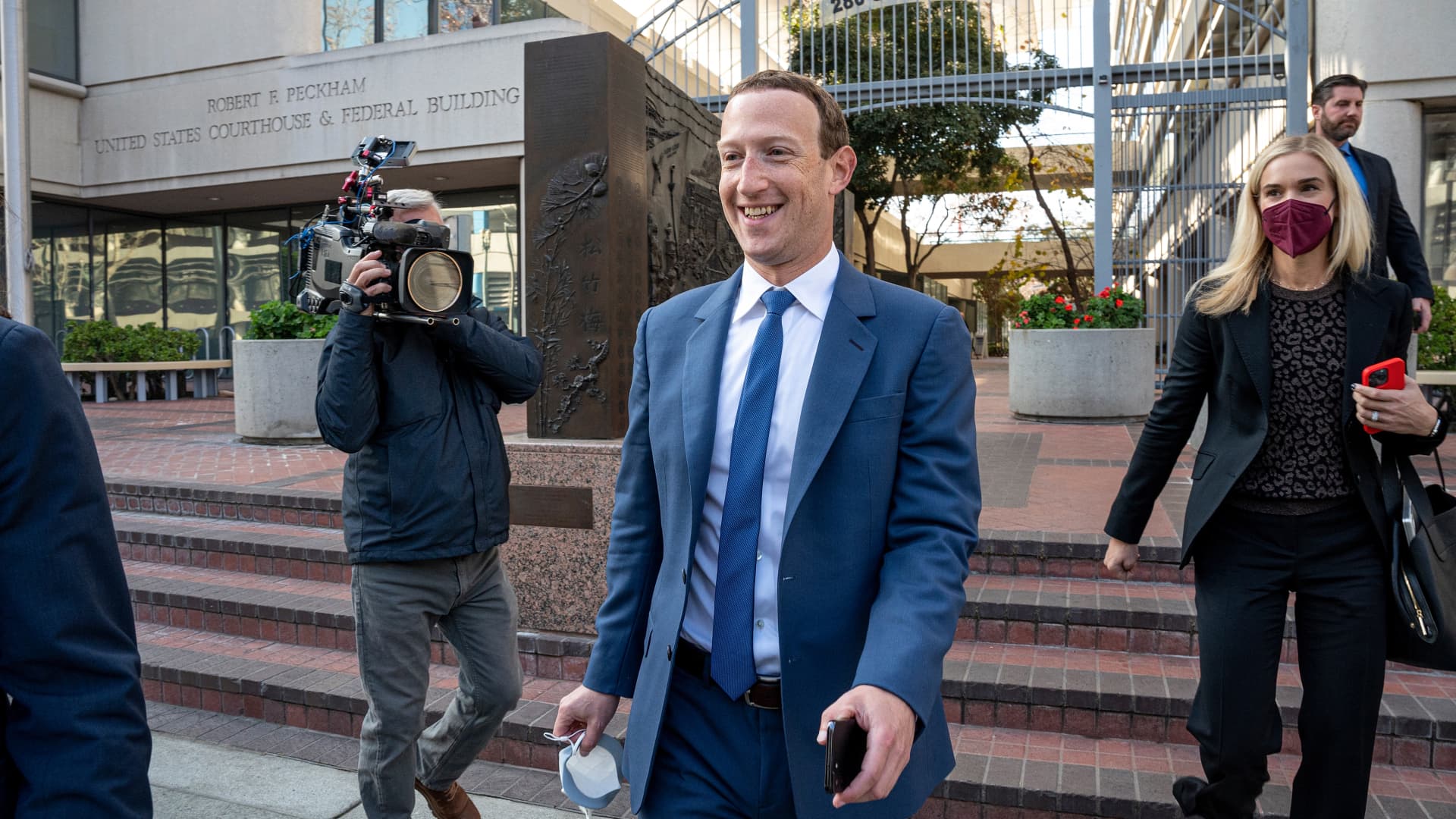SOCIAL
Meta ‘Year of Efficiency’ call from Zuckerberg was what Street needed

Mark Zuckerberg, chief executive officer of Meta Platforms Inc., center, departs from federal court in San Jose, Calif., on Dec. 20, 2022.
David Paul Morris | Bloomberg | Getty Images
With one simple slogan, Meta CEO Mark Zuckerberg temporarily quelled investor discontent with his company’s multibillion-dollar investment into the futuristic metaverse.
“Our management theme for 2023 is the ‘Year of Efficiency’ and we’re focused on becoming a stronger and more nimble organization,” Zuckerberg said as part of the release of Meta’s fourth-quarter earnings report.
Following a 64% plunge in Meta’s share price in 2022, Wall Street cheered the report, sending the stock up almost 20%, extending a rally that began late last year. Based on after-hours pricing, Meta is trading at its highest since July.
Growth is not what’s getting investors excited. Meta reported better-than-expected revenue in the fourth quarter, but sales still sank 4% from a year earlier, marking the third straight quarterly decline. And the forecast range for the first quarter suggests that year-over-year revenue could increase, but it could also fall again.
Rather, Zuckerberg’s commitment to cost cuts and efficiency is a sign that increasing profitability is important to Meta, which was known as a growth machine prior to last year’s slump.
“The first 18 years I think we grew it 20%, 30% compound or a lot more every year,” Zuckerberg said on the earnings call. “And then obviously that changed very dramatically in 2022, where our revenue was negative for growth, for the first time in the company’s history.”
In looking to the future, Zuckerberg struck a realistic tone.
“We don’t anticipate that that’s going to continue,” he said, regarding the recent drop in revenue. “But I also don’t think it’s going to go back to the way it was before.”
Meta lowered its estimates for total expenses in 2023 to be in the range of $89 billion to $95 billion, down from its prior outlook of $94 billion to $100 billion. In November, the company announced it would lay off over 11,000 workers, or 13% of its staff.
Zuckerberg said Meta will be more “proactive on cutting projects that aren’t performing or may no longer be crucial” and that it will emphasize “removing layers of middle management to make decisions faster.”
Meta is also reducing spending as it builds new data centers that are intended to be more efficient while still able to power the company’s various artificial intelligence technologies. Capital expenditures are now expected to be in the range of $30 billion to $33 billion for 2023 instead of $34 billion to $37 billion.
Zuckerberg is selling investors on a story they want to hear, acknowledging that the company got bloated and needed more financial discipline. One of Zuckerberg’s top deputies, technology chief Andrew “Boz” Bosworth, wrote a personal essay just a few days ago echoing that sentiment.
Still, Meta has plenty of challenges ahead, in terms of both costs and reviving its core ad business.
Meta’s Reality Labs unit, which is responsible for developing the nascent metaverse, lost $13.7 billion in 2022. Finance chief Susan Li told analysts that the company isn’t planning for any reduction in that unit anytime soon. Zuckerberg still sees it as the company’s future.
Digital advertising, meanwhile, is suffering from a struggling economy, and Li gave no indication that companies are planning to dramatically increase their spending in 2023.
Meta has also yet to recover from Apple’s 2021 iOS privacy update that made it harder to target users with ads. Li said the company has been improving its online advertising system, but Apple’s update is “still certainly an absolute headwind to our revenue number.”
During the question and answer part of the call, Zuckerberg was asked about Meta’s progress in generative artificial intelligence, which has become the latest hot thing in Silicon Valley. His answer indicated that Meta is pursuing opportunities there, but will be cautious in how quickly it proceeds. Running these programs is expensive, and Meta needs to ensure it can develop them affordably, he said.
Zuckerberg said that while Meta is researching how best to incorporate the new technology, he wants “to be careful not to get too ahead of the development of it.”
Correction: Meta’s earnings report and CEO Mark Zuckerberg’s comments occurred after the market close on Wednesday. An earlier version misstated the day.
WATCH: Meta grows in daily active users, shares pop on revenue beat


















You must be logged in to post a comment Login